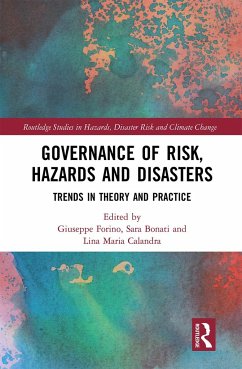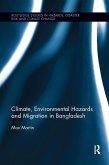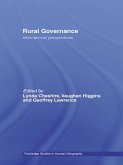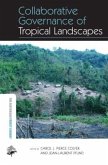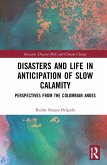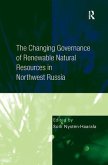Governance of Risk, Hazards and Disasters
Trends in Theory and Practice
Herausgeber: Forino, Giuseppe; Calandra, Lina Maria; Bonati, Sara
Governance of Risk, Hazards and Disasters
Trends in Theory and Practice
Herausgeber: Forino, Giuseppe; Calandra, Lina Maria; Bonati, Sara
- Broschiertes Buch
- Merkliste
- Auf die Merkliste
- Bewerten Bewerten
- Teilen
- Produkt teilen
- Produkterinnerung
- Produkterinnerung
Growing debates around governance are taking place among academic, policy-making, and practice-based communities. In light of the increasing focus on governance, this book presents and discusses governance as a framework that is able to both conceptualize and contextualize risks and disasters as currently experienced and managed into social systems. Contributions offer a variety of perspectives, experiences and socio-cultural contexts which have identified the challenges, opportunities and critiques of promoting governance. Part I explores approaches, models, and keywords as applied to risk…mehr
Andere Kunden interessierten sich auch für
![Climate, Environmental Hazards and Migration in Bangladesh Climate, Environmental Hazards and Migration in Bangladesh]() Max MartinClimate, Environmental Hazards and Migration in Bangladesh64,99 €
Max MartinClimate, Environmental Hazards and Migration in Bangladesh64,99 €![Empowerment and Social Justice in the Wake of Disasters Empowerment and Social Justice in the Wake of Disasters]() Sara BondessonEmpowerment and Social Justice in the Wake of Disasters33,99 €
Sara BondessonEmpowerment and Social Justice in the Wake of Disasters33,99 €![Rural Governance Rural Governance]() Rural Governance68,99 €
Rural Governance68,99 €![Collaborative Governance of Tropical Landscapes Collaborative Governance of Tropical Landscapes]() Collaborative Governance of Tropical Landscapes68,99 €
Collaborative Governance of Tropical Landscapes68,99 €![Environmental Management and Governance Environmental Management and Governance]() Raymond Burby / Jennifer Dixon / Neil Ericksen / John Handmer / Sarah Michaels (eds.)Environmental Management and Governance54,99 €
Raymond Burby / Jennifer Dixon / Neil Ericksen / John Handmer / Sarah Michaels (eds.)Environmental Management and Governance54,99 €![Disasters and Life in Anticipation of Slow Calamity Disasters and Life in Anticipation of Slow Calamity]() Reidar Staupe-DelgadoDisasters and Life in Anticipation of Slow Calamity63,99 €
Reidar Staupe-DelgadoDisasters and Life in Anticipation of Slow Calamity63,99 €![The Changing Governance of Renewable Natural Resources in Northwest Russia The Changing Governance of Renewable Natural Resources in Northwest Russia]() Soili Nystén-HaaralaThe Changing Governance of Renewable Natural Resources in Northwest Russia53,99 €
Soili Nystén-HaaralaThe Changing Governance of Renewable Natural Resources in Northwest Russia53,99 €-
-
-
Growing debates around governance are taking place among academic, policy-making, and practice-based communities. In light of the increasing focus on governance, this book presents and discusses governance as a framework that is able to both conceptualize and contextualize risks and disasters as currently experienced and managed into social systems. Contributions offer a variety of perspectives, experiences and socio-cultural contexts which have identified the challenges, opportunities and critiques of promoting governance. Part I explores approaches, models, and keywords as applied to risk and disaster governance theory. Part II investigates practices of risk governance and associated issues by focusing on disaster risk reduction policy and practice. Finally, Part III explores practices of disaster governance and associated issues, by focusing on disaster recovery experiences. This book highlights cutting-edge recent theoretical and empirical trends and is a valuable resource for students, academics, practitioners and policy-makers interested in risk and disaster governance.
Hinweis: Dieser Artikel kann nur an eine deutsche Lieferadresse ausgeliefert werden.
Hinweis: Dieser Artikel kann nur an eine deutsche Lieferadresse ausgeliefert werden.
Produktdetails
- Produktdetails
- Verlag: Routledge
- Seitenzahl: 324
- Erscheinungstermin: 30. September 2021
- Englisch
- Abmessung: 234mm x 156mm x 18mm
- Gewicht: 494g
- ISBN-13: 9780367506223
- ISBN-10: 036750622X
- Artikelnr.: 62570249
- Herstellerkennzeichnung
- Libri GmbH
- Europaallee 1
- 36244 Bad Hersfeld
- gpsr@libri.de
- Verlag: Routledge
- Seitenzahl: 324
- Erscheinungstermin: 30. September 2021
- Englisch
- Abmessung: 234mm x 156mm x 18mm
- Gewicht: 494g
- ISBN-13: 9780367506223
- ISBN-10: 036750622X
- Artikelnr.: 62570249
- Herstellerkennzeichnung
- Libri GmbH
- Europaallee 1
- 36244 Bad Hersfeld
- gpsr@libri.de
Giuseppe Forino holds a Ph.D in Economic Geography from Sapienza-University of Rome (Italy), where he analysed some community resilience experiences reconstructing the city of L¿Aquila after the 2009 earthquake. He is currently doing a second Ph.D course in the School of Architecture and Built Environment, University of Newcastle (Australia), in which he is analysing the integration of climate change adaptation and disaster risk reduction in the Hunter Region, NSW, Australia. He is also research assistant in the same school. He worked on national and international research projects on land degradation in Southern Italy, rural development policies in Veneto region (Italy), environmental evaluation and climate change adaptation in European regions and urban areas. He has several published and in-revision articles in international peer-review academic journals. With L.M. Calandra and A. Porru, he edited the book Multiple Geographical Perspectives on Hazards and Disasters, published in 2014 by Valmar, Rome, Italy, His research interests include: disaster resilience, disaster management, post disaster reconstruction, climate change adaptation, socio-economic aspects of land degradation, rural development policies, Italy, Australia. Sara Bonati is associate researcher at the Center of Local and Regional Studies (CIERL ¿ Centro de estudos locais e regionais), University of Madeira (Portugal). She holds a Ph.D. in Human and Physical Geography at the Veneto Doctoral School in Historical, Geographical and Anthropological studies, University of Padua (Italy). She has several published and in-press papers in international academic publications. She has coordinated the editorial board of the edited volume (Dis)memory of Disasters: An interdisciplinary approach, Funchal, Portugal (in press 2015). With G.M. Valent and M. Tononi, she is editing a book proposal for the Routledge series `Regions and Cities¿. Her research interests include: disaster risk reduction, climate change adaptation, disaster resilience building, risk perception, human rights in disasters, disaster cultures, rural and urban studies. Lina Maria Calandra is Associate Professor in Geography at the Department of Human Studies, University of L¿Aquila (Italy). She teaches Geography and Cartography and is the head of the cartographic laboratory `Cartolab¿. Her fields of research are the geography of colonialism in Africa, as well as the problems of conservation with a focus on the relationships between environmental conflicts and local development in Africa and in the Apennines. Since the aftermath of the earthquake in L¿Aquila on 6 April 2009, she has been analysing the social geography of vulnerability and resilience in the city, and mapping the social and territorial consequences of hazards and disasters. She has been editor of the journal Terra d¿Africa . She has published several articles in national and international peer-review journals. She has published the books Atlante del turismo sostenibile in Africa (2007), Progetto geografia. Percorsi di riflessione e didattica (2007 and 2009), and as has edited the books Territorio e Democrazia. Un laboratorio di geografia sociale nel doposisma aquilano (2012) on social geography in post-disaster L¿Aquila, and Multiple Geographical Perspectives on Hazards and Disasters (2014), with G. Forino and A. Porru.
Governing risks, hazards and disaster in theory and practice: an
introduction and overview of the book GIUSEPPE FORINO, SARA BONATI AND LINA
MARIA CALANDRA
PART I Governance of risk and disasters: approaches and models
1 The diversity of governance approaches in the face of resilience GONZALO
LIZARRALDE, LEE BOSHER, CHRISTOPHER BRYANT, KSENIA CHMUTINA, GEORGIA
CARDOSI, ANDREW DAINTY AND DANIELLE LABBÉ
2 Multi-scalar disaster governance and vulnerability in Chile VICENTE
SANDOVAL AND MARTIN VOSS
3 The disaster chronotope: spatial and temporal learning in governance of
extreme events BERILL BLAIR, AMY LAUREN LOVECRAFT AND RICHARD HUM
4 Governance of risk and disasters: considerations on the role of citizen
participation in L'Aquila (Italy) LINA MARIA CALANDRA
5 Disaster governance and democracy: Meta-legal Praxis in L'Aquila (Italy)
GIAN MARIA VALENT
PART II Risk governance: practices, challenges and opportunities
6 Governing the integration of climate change adaptation into disaster risk
reduction: insights from two Australian local governments GIUSEPPE FORINO,
JASON VON MEDING AND GRAHAM BREWER
7 Governing climate change adaptation in New York City: an analysis of
recent actions BEN D. WALLACE AND ILAN KELMAN
8 Linking science, policy and practice for climate risk governance in the
Marche Region (Central Italy) FEDERICA APPIOTTI AND FAUSTO MARINCIONI
9 Food insecurity risk and global governance guidelines on agriculture:
evidence from the Senegal River Delta MAURA BENEGIAMO AND DAVIDE CIRILLO
PART III Disaster governance: practices, challenges and opportunities
10 Disaster governance: a political ecology perspective on land, housing
and property rights violations SARA BONATI
11 Armed forces in disaster response: problems and perspectives on disaster
governance in India ROSHNI PRAMANIK
12 Disaster diplomacy and disaster governance from a Balkan perspective:
post-earthquake rapprochement in Greece-Turkey STAVROS MAVROGENIS AND ILAN
KELMAN
13 Disaster governance and the rise of social media: ethnographic
perspectives from Germany KRISTOFFER ALBRIS
14 Social media and disaster governance: Twitter use in recent floods in
Italy FABIO CARNELLI AND GUIDO ANSELMI
15 Planning and governance for disaster recovery in Tacloban after Typhoon
Haiyan (the Philippines) MARK KAMMERBAUER, IDERLINA B. MATEO-BABIANO AND
JOHN MINNERY
16 Is disaster education just knowledge transmission? Co-learning and
disaster governance in Japan HIDEYUKI SHIROSHITA
transmission? Co-learning and disaster governance in Japan HIDEYUKI
SHIROSHITA
introduction and overview of the book GIUSEPPE FORINO, SARA BONATI AND LINA
MARIA CALANDRA
PART I Governance of risk and disasters: approaches and models
1 The diversity of governance approaches in the face of resilience GONZALO
LIZARRALDE, LEE BOSHER, CHRISTOPHER BRYANT, KSENIA CHMUTINA, GEORGIA
CARDOSI, ANDREW DAINTY AND DANIELLE LABBÉ
2 Multi-scalar disaster governance and vulnerability in Chile VICENTE
SANDOVAL AND MARTIN VOSS
3 The disaster chronotope: spatial and temporal learning in governance of
extreme events BERILL BLAIR, AMY LAUREN LOVECRAFT AND RICHARD HUM
4 Governance of risk and disasters: considerations on the role of citizen
participation in L'Aquila (Italy) LINA MARIA CALANDRA
5 Disaster governance and democracy: Meta-legal Praxis in L'Aquila (Italy)
GIAN MARIA VALENT
PART II Risk governance: practices, challenges and opportunities
6 Governing the integration of climate change adaptation into disaster risk
reduction: insights from two Australian local governments GIUSEPPE FORINO,
JASON VON MEDING AND GRAHAM BREWER
7 Governing climate change adaptation in New York City: an analysis of
recent actions BEN D. WALLACE AND ILAN KELMAN
8 Linking science, policy and practice for climate risk governance in the
Marche Region (Central Italy) FEDERICA APPIOTTI AND FAUSTO MARINCIONI
9 Food insecurity risk and global governance guidelines on agriculture:
evidence from the Senegal River Delta MAURA BENEGIAMO AND DAVIDE CIRILLO
PART III Disaster governance: practices, challenges and opportunities
10 Disaster governance: a political ecology perspective on land, housing
and property rights violations SARA BONATI
11 Armed forces in disaster response: problems and perspectives on disaster
governance in India ROSHNI PRAMANIK
12 Disaster diplomacy and disaster governance from a Balkan perspective:
post-earthquake rapprochement in Greece-Turkey STAVROS MAVROGENIS AND ILAN
KELMAN
13 Disaster governance and the rise of social media: ethnographic
perspectives from Germany KRISTOFFER ALBRIS
14 Social media and disaster governance: Twitter use in recent floods in
Italy FABIO CARNELLI AND GUIDO ANSELMI
15 Planning and governance for disaster recovery in Tacloban after Typhoon
Haiyan (the Philippines) MARK KAMMERBAUER, IDERLINA B. MATEO-BABIANO AND
JOHN MINNERY
16 Is disaster education just knowledge transmission? Co-learning and
disaster governance in Japan HIDEYUKI SHIROSHITA
transmission? Co-learning and disaster governance in Japan HIDEYUKI
SHIROSHITA
Governing risks, hazards and disaster in theory and practice: an
introduction and overview of the book GIUSEPPE FORINO, SARA BONATI AND LINA
MARIA CALANDRA
PART I Governance of risk and disasters: approaches and models
1 The diversity of governance approaches in the face of resilience GONZALO
LIZARRALDE, LEE BOSHER, CHRISTOPHER BRYANT, KSENIA CHMUTINA, GEORGIA
CARDOSI, ANDREW DAINTY AND DANIELLE LABBÉ
2 Multi-scalar disaster governance and vulnerability in Chile VICENTE
SANDOVAL AND MARTIN VOSS
3 The disaster chronotope: spatial and temporal learning in governance of
extreme events BERILL BLAIR, AMY LAUREN LOVECRAFT AND RICHARD HUM
4 Governance of risk and disasters: considerations on the role of citizen
participation in L'Aquila (Italy) LINA MARIA CALANDRA
5 Disaster governance and democracy: Meta-legal Praxis in L'Aquila (Italy)
GIAN MARIA VALENT
PART II Risk governance: practices, challenges and opportunities
6 Governing the integration of climate change adaptation into disaster risk
reduction: insights from two Australian local governments GIUSEPPE FORINO,
JASON VON MEDING AND GRAHAM BREWER
7 Governing climate change adaptation in New York City: an analysis of
recent actions BEN D. WALLACE AND ILAN KELMAN
8 Linking science, policy and practice for climate risk governance in the
Marche Region (Central Italy) FEDERICA APPIOTTI AND FAUSTO MARINCIONI
9 Food insecurity risk and global governance guidelines on agriculture:
evidence from the Senegal River Delta MAURA BENEGIAMO AND DAVIDE CIRILLO
PART III Disaster governance: practices, challenges and opportunities
10 Disaster governance: a political ecology perspective on land, housing
and property rights violations SARA BONATI
11 Armed forces in disaster response: problems and perspectives on disaster
governance in India ROSHNI PRAMANIK
12 Disaster diplomacy and disaster governance from a Balkan perspective:
post-earthquake rapprochement in Greece-Turkey STAVROS MAVROGENIS AND ILAN
KELMAN
13 Disaster governance and the rise of social media: ethnographic
perspectives from Germany KRISTOFFER ALBRIS
14 Social media and disaster governance: Twitter use in recent floods in
Italy FABIO CARNELLI AND GUIDO ANSELMI
15 Planning and governance for disaster recovery in Tacloban after Typhoon
Haiyan (the Philippines) MARK KAMMERBAUER, IDERLINA B. MATEO-BABIANO AND
JOHN MINNERY
16 Is disaster education just knowledge transmission? Co-learning and
disaster governance in Japan HIDEYUKI SHIROSHITA
transmission? Co-learning and disaster governance in Japan HIDEYUKI
SHIROSHITA
introduction and overview of the book GIUSEPPE FORINO, SARA BONATI AND LINA
MARIA CALANDRA
PART I Governance of risk and disasters: approaches and models
1 The diversity of governance approaches in the face of resilience GONZALO
LIZARRALDE, LEE BOSHER, CHRISTOPHER BRYANT, KSENIA CHMUTINA, GEORGIA
CARDOSI, ANDREW DAINTY AND DANIELLE LABBÉ
2 Multi-scalar disaster governance and vulnerability in Chile VICENTE
SANDOVAL AND MARTIN VOSS
3 The disaster chronotope: spatial and temporal learning in governance of
extreme events BERILL BLAIR, AMY LAUREN LOVECRAFT AND RICHARD HUM
4 Governance of risk and disasters: considerations on the role of citizen
participation in L'Aquila (Italy) LINA MARIA CALANDRA
5 Disaster governance and democracy: Meta-legal Praxis in L'Aquila (Italy)
GIAN MARIA VALENT
PART II Risk governance: practices, challenges and opportunities
6 Governing the integration of climate change adaptation into disaster risk
reduction: insights from two Australian local governments GIUSEPPE FORINO,
JASON VON MEDING AND GRAHAM BREWER
7 Governing climate change adaptation in New York City: an analysis of
recent actions BEN D. WALLACE AND ILAN KELMAN
8 Linking science, policy and practice for climate risk governance in the
Marche Region (Central Italy) FEDERICA APPIOTTI AND FAUSTO MARINCIONI
9 Food insecurity risk and global governance guidelines on agriculture:
evidence from the Senegal River Delta MAURA BENEGIAMO AND DAVIDE CIRILLO
PART III Disaster governance: practices, challenges and opportunities
10 Disaster governance: a political ecology perspective on land, housing
and property rights violations SARA BONATI
11 Armed forces in disaster response: problems and perspectives on disaster
governance in India ROSHNI PRAMANIK
12 Disaster diplomacy and disaster governance from a Balkan perspective:
post-earthquake rapprochement in Greece-Turkey STAVROS MAVROGENIS AND ILAN
KELMAN
13 Disaster governance and the rise of social media: ethnographic
perspectives from Germany KRISTOFFER ALBRIS
14 Social media and disaster governance: Twitter use in recent floods in
Italy FABIO CARNELLI AND GUIDO ANSELMI
15 Planning and governance for disaster recovery in Tacloban after Typhoon
Haiyan (the Philippines) MARK KAMMERBAUER, IDERLINA B. MATEO-BABIANO AND
JOHN MINNERY
16 Is disaster education just knowledge transmission? Co-learning and
disaster governance in Japan HIDEYUKI SHIROSHITA
transmission? Co-learning and disaster governance in Japan HIDEYUKI
SHIROSHITA

